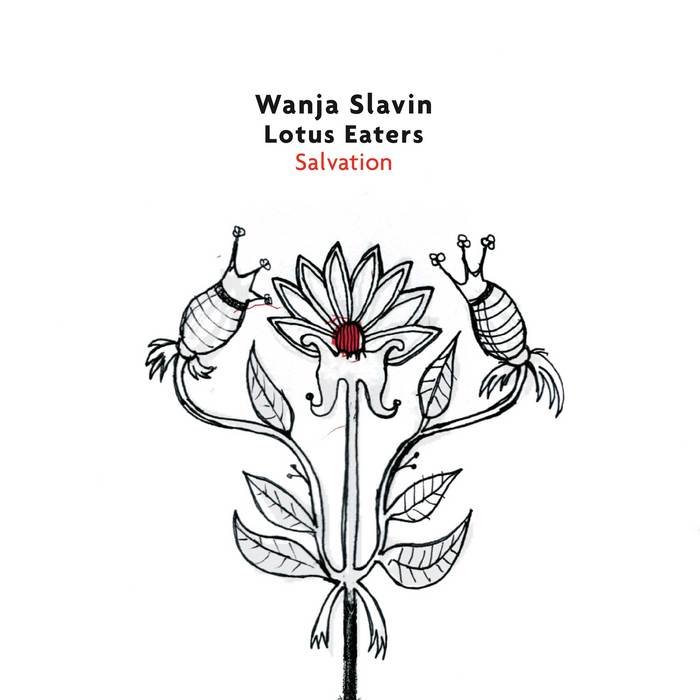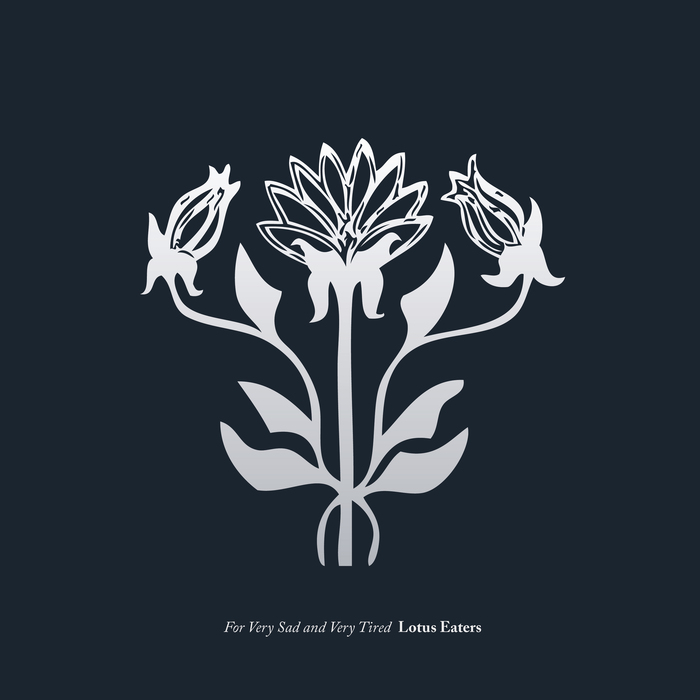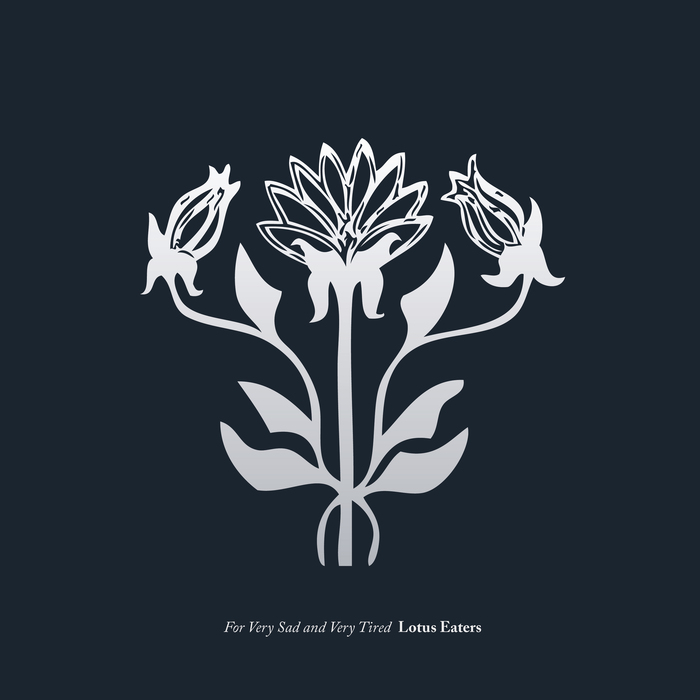Salvation by Wanja Slavin Lotus Eaters
2018 WhyPlayJazz (RS035), CD + MP3 Album Download
Track listing
Line-up
Tom Arthurs (tp), Erik Kimestad Pedersen (tp), Wanja Slavin (as, synth), Philipp Gropper (ts), Rainer Böhm (p, rhodes), Andreas Lang (b), Bernhard Meyer (eb), Petter Eldh (b, eb, synth), Ivars Arutyunyan (dr), Tobias Backhaus (dr), Nasheet Waits (dr)
Production credits
Track 1 recorded March 24, 2016 by Falko Duczmal at Forest Studios Steinbeck, Germany. Track 2/3/4 recorded September 28/29, 2016 by Marco Birkner at Casa San Francesco Loft Studios, Italy. Track 5/6/7 recorded January 19, 2017 by Rainer Robben at AudioCue Tonstudios Berlin, Germany. Produced by Wanja Slavin for WhyPlayJazz. Mixed by Marck Fuck. Mastered by Katherine Miller. Photo by Dovile Sermokas. Design and artwork by Travassos. Supported by Initiative Musik gGmbH with project funds from the Federal Government Commissioner for Culture and the Media, Germany.
Wanja Slavin (BMW World Jazz Award, Echo Jazz Award) presents his new album, “Salvation” with music that dazzles like the iridescent layers of a rainbow, evoking a radiance and authority – seven compositional gems with an orchestral feeling, rich tonal colors and sophisticated arrangements.
It’s a given that he’s one of the best alto saxophonists in Germany – or anywhere else, for that matter. His play has earned him the commensurate awards – important waystations along Wanja Slavin’s musical journey rather than any sort of existential musical goal.
The exceptional new album from Slavin and his Lotus Eaters is the best evidence that the bandleader wants more. It’s the reason why he is so meticulous about the music he releases and why he so scrupulously fine-tunes his arrangements; it’s why time and again he alters his band personnel in order to more conclusively encompass the overriding musical ideas.
The music on “Salvation” dazzles like the iridescent layers of a rainbow. Yet it does not intrude on or attempt to overwhelm the listener. It develops its radiant power and authority reflectively, with discipline, devoid of clichés. In listening, one witnesses the burgeoning of something beautiful. Known for his free play in diverse Avant-garde constellations, here Wanja commits to the melodics of song form. Wanja Slavin considers The Lotus Eaters to be his most important band.
Like a gourmet, he seeks out the musicians that best suit his intentions. Thus, this second Lotus Eaters album consists of three recording sessions with alternating lineups and seven musical gems. There is an orchestral feeling to the music, with rich tonal colors and sophisticated arrangements. The solos are delineated, and come quickly and precisely to the particular point, since totally free play would not serve the purpose. Less is more, with pieces that project the feel of thoroughly arranged pop songs, or a kinship to Alfred Schnittke, or they could be the heroes of an imaginary Shorter-Wheeler-Konitz lineup leaning towards a rare multi-dimensional quality. After listening to the music, it’s clear that the particular line-up is essential.
Wanja isn’t one to hide behind his music. In this postmodern period, he has to deal with everything that’s out there. With the Lotus Eaters, he has come a long way in the art of defining and refining the essential. He doesn’t copy and he stays clear of irony. He doesn’t need those crutches because he’s not afraid of standing on his own two feet.
The music alludes to something precious that goes beyond the six individuals involved and towards a spiritual level in which everything is transformed.
Reviews
The seven tracks on "Salvation" are the impressive calling card of an instrumentalist and composer who has been profoundly heard for several years now and whose work has been awarded with several prizes. [...] It is a jazz that trusts in melodies and emotions, lives out sound images, crystallizes interplays, and integrates eclectic influences so elegantly that never the feeling of construction or diligent work comes up. [...] "Salvation" is far from pushing into the foreground with fashionably well-written vocabulary. Here, a breath of music that is based on the Songhaft and with their moods and exciting interactions makes the contemporary Jazzuniversum richer.
Kontemplativ bis spirituell ist die Grundstimmung, manches davon hat keine Angst vor Fusion, das Heil dieser „Salvation“ liegt keinesfalls im Purismus. Trotzdem hat „Salvation“ eine wunderbar geschlossene Stimmung, setzt hier und da energischere Akzente, verliert aber nie seine stabil gesetzten Bögen aus dem Blick, die scheinbar wenig benötigen, um zu halten.
The saxophonist creates here on the basis of calm modern jazz a sleepy and at the same time bright-awake mood, which mixes up with one or the other misunderstanding, so that it does not get too well-feeling; he creates a midnight dreamland of sounds in which one wants to disappear, with which one wants to be one, dissolving the boundary between inside and outside.
For years Wanja Slavin was regarded as a saxophone miracle, but also as a saxophone phantom - sometimes he was there, sometimes not. Since 2014, the alto saxophonist seems to be permanently present [...]. He keeps on remaking, he is not satisfied for a long time. Even the best recording is not valid for him, as long as the feeling is not right. Slavin's feeling wants a medium tempo, a gentle, abstract brass section, a brooding, gradually increasing dynamic, ecstatic increases, collective improvisations, liberating solos. With this mature work Slavin overtakes his own phantom. [...] It is a new beginning, a very big one.
Easy flowing orchestral soundscapes, multi-dimensional tonal textures and a fine balance between acoustic and electric vibes.
[...] die Musik der Lotus Eaters trübt keinerlei Zeitkolorit. Sie schwebt auf der Suche nach ihren eigenen Glücksmomenten über Stile und Zeiten hinweg wie eine majestätische, vielleicht manchmal leicht ins regengrau spielende Cumuluswolke.
Wanja Slavin Lotus Eaters would appear to be less a fixed entity than a malleable unit the leader adjusts to suit the material in play. To that end, the seven pieces comprising Salvation, the alto saxophonist's second Lotus Eaters album, were laid down in three recording sessions using alternating lineups, an acoustic jazz ensemble thus appearing on some tunes and an electrified outfit on others. [...] Salvation is distinguished by the quality of its compositions and performances, and at forty minutes states its case with commendable concision.
The presence of this music is large—huge, even, at times—but the intricacies that guide the ear through each of the seven pieces of Salvation give the music the kind of rich details that make a short story seem like an epic journey. This isn’t an album that seeks to dazzle the listener with vivid imagery; it’s a ceaseless stream that provides one thrill after the other, and a different emotional reaction for each change in tone and tempo and harmonic embrace. This is one of the gems, thus far, of 2018 [...].
"When I've written a piece I like, I always have a pretty good idea of what vibe I want. If we do not get that (un)certain feeling, I can not or do not want to put that on a record. This is probably the reason why this record took me so long" This explains why it has been relatively less records from an omnipresent alto saxophonist and composer. So far there are only a few shots. Therefore, one should consider and preserve the existing as a gem!
[...] a CD that I could not stop listening to [...].
As a rule, a band is a defined group of musicians who implement one or more projects in a particular constellation. This is not the case with Wanja Slavin's Lotus Eaters, who are competing in three different formations on their new CD "Salvation". Surprisingly, the saxophonist from Berlin manages to weave a very stringent acoustic novel out of this squad puzzle [...]. He is an impressionist who loves when all the elements flow into each other. Harmonies and melodies are as important to him as a homogeneous tone color image. [...] "I am looking for musicians like Philipp Gropper, with whom I can implement such ideas, but I am still far from having the search." Thus, "Salvation" is ultimately the atmospheric documentation of a successful search.
However effortlessly [Wanja Slavin in the band "Amok Amor"] could follow the intricate instrumental art of his colleagues, so much did Slavin's own qualities as a wonderful melodicist and expressive composer were lost in the much admired project. Now he convinces with the second CD production of his "Lotus Eaters" all along the line. "Salvation" [...] captivates with a group sound, which emphasizes the common soundscape in three moderately varied sextet settings instead of setting up launcher for soloistic splendor. The pieces develop into subtle layers. Individual voices push each other forward. Sensitive, lively syncopated rhythms give the whole thing a good drive, casually developing a gentle retro sound.
We would like to listen to the musicians, who make up the wealth of the Berlin scene, on the French stages. [...] Wanja Slavin, alto saxophonist, composer and leader of Lotus Eaters, deserves an invitation! As in the previous album, he proves his attachment to the great history of modern jazz, which is reflected in his compositions. However, he knows how to add his own note (a special way of dealing with harmonies, the integration of electronic instruments, a certain poetry ...) [...] A musician who should not lose sight of and an album that does deserves to appear on the shopping list!
[...] the alto saxophonist, born in Freiburg in 1982, who is capable of expressive ecstasy, for instance in interaction with the high-energy drummer Christian Lillinger, is a scrupulously puritanical perfectionist in his own projects [...]. The title is program, the salvation of every listener certainly.
Wanja Slavin Lotus Eaters is a sextet with a beautiful timbre. The group plays contemporary compositions with an excellent balance between melody, atmosphere and improvisation. [...] The compositions are modern in structure, but sound harmonious in combination with polyrhythms, exciting themes and intense solo work. [...] With the CD 'Salvation', the Lotus Eaters would be a big win for the upcoming festival season.
In each of the seven pieces, the three variants of the Wanja Slavin Lotus Eaters break the respective conventions.
From the very first notes of the album it is immediately apparent that this is a modern Jazz masterpiece in every respect. The melody based compositions are dressed up in contemporary arrangements, which include unusual rhythmic patterns and harmonic structures, creating a unique kaleidoscope of superb music, which is fascinating from start to finish and does not cease to explore uncharted territory and create new aural vistas. The level of these compositions is completely breathtaking and has very little competition elsewhere within music belonging to the same Jazz dialect. The ability to create an amalgam of the Jazz tradition, Classical influences and up to date approach, which incorporates elements form electronic music and above all allows a generous amount of space and freedom for improvisation is overall extremely effective. [...]
This album is a brilliant example of what European Jazz is all about; it is evident in its highly aesthetic values, its elegance and subtlety, its refinement and sophistication, which is simply unmatched anywhere else on this planet. The young Jazz Artists from Berlin, Warsaw, Copenhagen and Oslo manage to take the Jazz idiom to the next level, leaving the old world tarried far behind. If this album is an indication as to what can be expected in 2018, life is definitely worth living and there is no better way to kickoff another year of sublime music!
A penchant for perfection can be found in the compositions and arrangements of Slavin. It is not about wild, raw jazz, but about carefully constructed musical structures in which each note is important and fits in, but in which also is room for improvisation. [...] Wanja Slavin Lotus Eaters offer disciplined, ingenious and soulful jazz.
Each note plays a big role in the process, just like each chord fills us with its richness and resonance. [...] This is what I call intelligent jazz. Without assuming a spotlight-craving role, Slavin assures a responsive treatment to his compositions and still makes everyone shine. Salvation got me hooked on its contemporary charm.
Although he is associated primarily with the avant-garde scene, for "Salvation" presents Slavin melodious compositions with rich, sophisticated arrangements. [...] Very good, original album.
Mit gleich drei Besetzungen arbeitet der Berliner Altsaxofonist Wanja Slavin auf dem neuen Album seiner 2012 formierten Band "Lotus Eaters", mit der er zum zweiten Mal nach dem 2014 erschienenen "For Very Sad and Very Tired Lotus Eaters" aufnimmt. Solch kompromissloser Formwille, der nicht den Kontingenzen der Terminverfügbarkeit geschuldet ist, sondern sich Slavins spielästhetischer Akkuratesse verdankt, nimmt einen sofort für sich ein.


